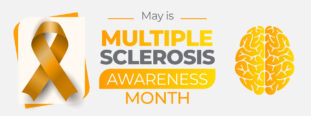The other neck sign of MS
Multiple sclerosis can be associated with sudden nerve pain if a person tries touching their chin to their chest. The more commonly known of these conditions is called Lhermitte’s symptom (often incorrectly called a “sign”). But a second neck symptom has recently been reported.
Lhermitte’s symptom (sometimes called the barber chair phenomenon) was first described over a century ago. It’s an electric shock sensation that travels down the spine to the hands and feet when the neck is flexed forward. In MS, the cause of the pain is believed to be inflammation and demyelination (a loss of the myelin protecting nerve fibres) of nerves at the top of the spine (called the cervical spine). The pain can also be triggered when the neck is moved during a period of overheating (as in a hot bath) – but it shouldn’t be confused with the Uhthoff phenomenon, which is a worsening of MS symptoms (not necessarily neck-related pain) because of heat exposure.
About 1 in 5 people with MS experience Lhermitte’s symptom (Beckmann and colleagues. Acta Neurol Belg 2015;115:605-608). It’s very painful but it isn’t an indication of the severity of MS. No investigations or treatments are typically needed, and the pain usually goes away on its own. However, Lhermitte’s should be reported to a doctor since it’s not unique to MS. Many other conditions can cause it (including vitamin B12 deficiency, neck trauma and other illnesses) so these need to be ruled out. There have been reports of people developing Lhermitte’s as part of a discontinuation syndrome when they stop taking an antidepressant (e.g. Paxil) (Reeves & Pinkofsky. J Clin Psychopharmacol 1996;16:411-412. Reeves and colleagues. Pharmacotherapy 2003;23:678-681), but this appears to be rare. If Lhermitte’s pain persists, a medication used to treat nerve pain may provide some relief.
Neurologists have recently added a second neck syndrome, called McArdle’s sign (symptom), that can occur in people with MS (Savoldi and colleagues. Mayo Clin Proc 2019;94:1427-1435). What this describes is muscle weakness in the hands if the neck is flexed (chin pressed down onto the chest). The muscle weakness is seen if you press down on the back of your fingers and try to push the fingers back up. A 10% loss of muscle strength in raising your fingers when the neck is flexed is McArdle’s sign. So it is a muscle symptom, not a nerve (sensory) symptom like Lhermitte’s. According to a preliminary study, McArdle’s appears to be uniquely found in people with MS, so it may become one of the tests a neurologist uses to help diagnose MS.
Share this article
Facebook Twitter pin it! Email
Related Posts
Back





